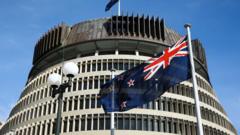In a decisive ruling delivered in New Zealand's Parliament, Speaker Gerry Brownlee stated that he will not entertain any further complaints regarding the use of the Māori name "Aotearoa," which is increasingly recognized alongside the English name “New Zealand.” This statement follows a controversial request made by Deputy Prime Minister Winston Peters to prohibit the use of "Aotearoa" in parliamentary debates and to suggest a national referendum for its acceptance.
Brownlee noted that "Aotearoa," meaning "land of the long white cloud," is not just an informal term; it appears on legal documents such as passports and currency, and is also used in the Māori version of New Zealand's national anthem. He emphasized the importance of honoring the country's three official languages—English, Māori, and New Zealand sign language—and stated, "If certain members do not like specific words, they are not obligated to use them."
The tension surfaced when new Green MP Ricardo Menéndez March, who is originally from Mexico, used "Aotearoa" during a parliamentary session, prompting Peters' objection and raising questions about the appropriateness of actions taken by newer citizens regarding the nation’s naming.
Brownlee had earlier suggested the use of “Aotearoa New Zealand” to mitigate confusion, although he clarified that this was not a mandatory requirement. The conversation around "Aotearoa" reveals deep-seated issues surrounding national identity and recognition, with various Māori perspectives contributing to the ongoing debate. Some Māori regard the name as representative of indigenous culture, while others argue that its original application referred only to the North Island.
Further complicating the dialogue, Peters maintained his dissent against the ruling, indicating that while he respects Māori culture, he disagrees with using "Aotearoa" in Parliament and would refrain from responding to questions if posed using that terminology.
The advocacy for the name "Aotearoa" has been gaining momentum, highlighted by a 2022 petition from the Māori Party seeking an official name change, which attracted over 70,000 signatures. Proponents argue that "New Zealand," a name with Dutch origins, fails to authentically connect with the land's indigenous heritage. Recent government discourse has indicated a move towards prioritizing English in official communications, igniting frustration among those advocating for Māori representation.
The conversation continues to evolve, underlined by the challenges posed by current political leadership seeking to reshape agreements laid out in the Treaty of Waitangi, a foundational document for New Zealand. This multifaceted debate encapsulates the tensions surrounding New Zealand’s identity as it navigates between its colonial history and indigenous recognition.



















